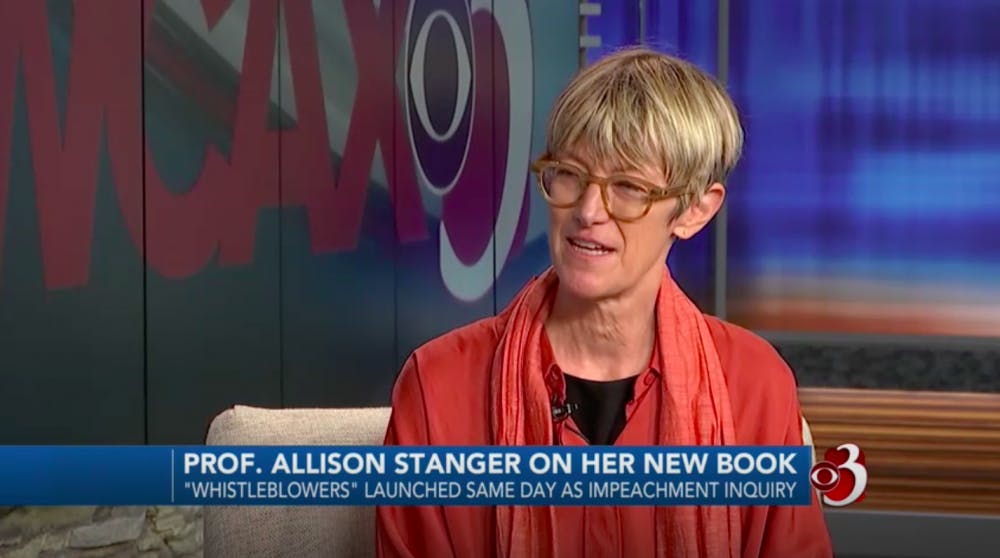Political Science Professor Allison Stanger has begun her third year of academic leave from Middlebury. With minimal communication as to her whereabouts, students continue to wonder if and when she will return.
Currently a technology and human values senior fellow at Harvard University’s Edmund J. Safra Center for Ethics, Stanger is “working on projects of her own,” according to Harvard Fellowships and Programs Manager Emily Bromley. Bromley was unable to provide further details of Stanger’s work at Harvard, but said “we are thrilled to have her here with us.”
Stanger is also a visiting professor with Harvard’s Department of Government, and will be teaching a course on the politics of virtual realities in the spring.
At the end of what was intended to be a two-year leave, Stanger disclosed plans to remain off campus for a third consecutive year in an email to the Middlebury Political Science faculty and staff. In the email, she announced her fellowship and visiting professorship, adding that she would also be a faculty fellow at the Ash Center for Democratic Governance at the Kennedy School of Government.
Stanger’s official leave began in the fall of 2017, the semester after students shut down a lecture by controversial speaker Charles Murray. Stanger had been slated to mediate the Q&A with Murray, which she eventually did when the lecture moved to a livestream format following disruption from the protesters.
When the pair exited the venue, Stanger was jostled by a crowd. She suffered a concussion and neck injury.
The faculty handbook states that sabbaticals can last either six months or a full year, but does not make mention of two- or three-year leaves.
“When there are extraordinary opportunities faculty have the capacity to extend their leaves,” Dean of Faculty Sujata Moorti told The Campus.
Moorti did not say whether Stanger was on paid leave, since the matter is “relate[d] to confidential personnel information.”

Stanger spoke on WCAX-TV about her new book and the impeachment inquiry.
One of Stanger’s former advisees, who asked to remain anonymous, has received minimal information about Stanger’s absence.
“When I asked Professor Stanger to be my adviser, she told me she was planning on taking a year’s sabbatical,” Stanger’s former advisee said. “It was only when I got back from the summer did I find out it was for two. I heard from a student and not the department.”
The advisee said the department was otherwise supportive, and they were able to find a new adviser to take Stanger’s place.
“I’ve tried to get in touch with Professor Stanger but despite sending her multiple emails, have never received a response,” the advisee said.
Political Science Department Chair Erik Bleich said the department has had to adjust to accommodate Stanger’s absence.
“She teaches a number of very popular courses in our department,” Bleich said. “We’ve been lucky to have Professor Felicia Grey join us for the three years of Professor Stanger’s time away from campus.”
Grey has been filling the department’s course offerings as a visiting professor in the international relations subfield, Stanger’s area of expertise.
Political Science Professor Kemi Fuentes-George said that the department has been able to offer more options for the International Politics course with Grey on the faculty, but that the college has not been able to offer Stanger’s American Foreign Policy course since her leave.
“My knowledge about her plans is and has been extremely minimal,” Fuentes-George added.
Grey will be teaching American Foreign Policy this spring.
Stanger has made a host of public appearances since her leave. In the immediate wake of the Charles Murray incident, Stanger wrote op-eds, spoke on panels and at conferences, and testified before a U.S. Senate committee about free speech on college campuses. Most recently, Stanger has been promoting her new book, “Whistleblowers: Honesty in America from Washington to Trump,” which she released on Sept. 24.
The book was coincidentally released the same day that House Speaker Nancy Pelosi announced a formal impeachment inquiry against President Donald Trump, following a whistleblower complaint that detailed conversations between Trump and the president of Ukraine about Joe Biden and his son, Hunter Biden.
The day after the book’s release, Stanger published a piece about whistleblowers in The Atlantic and was interviewed about her book on NPR. Stanger told Vermont’s WCAX-TV in an interview posted on Sunday that she believes whistleblowing is “heroic, and a bipartisan, American duty necessary to keep our nation’s elites honest and our democracy intact.”
Stanger’s fellowship at Harvard is scheduled to end on May 31, 2020. According to Political Science Department Coordinator Linda Booska, Stanger plans to return to campus next year.
Stanger did not respond to repeated requests for comment.
Editor’s note: A previous version of this article referred to Stanger’s former advisee by name. The advisee has since requested their name to be redacted from the article.
A previous version of the article also did not note that Grey will teach American Foreign Policy this spring. The article has since been updated.




